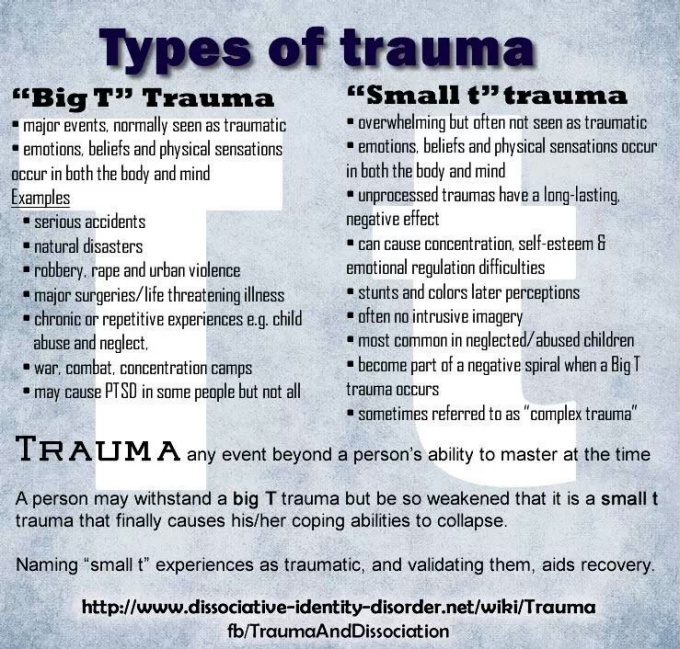Little-t and Big-T trauma
It’s important to explain how I use the word trauma in my work. Our bodies carry some residue of physical and psychological tension because most of us have encountered some personal harm, injury or stress that was either physically and/or emotionally overwhelming.
“Trauma may begin as acute stress from a perceived life-threat or as the end product of cumulative stress. Both types of stress can seriously impair a person’s ability to function with resilience and ease.” Dr. Peter Levine.
These memories, if not adequately processed, are stored in the body/mind as either “little-t traumas” or “big-T traumas”. The line between these two kinds of trauma is sometimes fuzzy.
“Little-t trauma”
Although not life-threatening, these are highly disturbing events that evoke overwhelming negative emotions and result in painful, unresolved memories which negatively impact our view of self and others. Most of us have had several such experiences during our lifetime, with events that occur in childhood having the greatest emotional impact.
Examples are: being separated from parents, being bullied or punished at school, the death of a pet, rejection from your family in the coming-out process. Psychological abuse, which is a core component of domestic violence, can be even more devastating than physical abuse because of its pervasive and often invisible nature.
Other examples of “little-t traumas” are experiences which exceed our capacity to cope.
Included are the pervasive, anxiety-provoking scenes from our past, especially childhood, such as humiliation or being rejected which can be significant and can have lasting negative consequences. “Little-t traumas” also include any repeated or ongoing criticism/disregard/neglect/abuse of every type, where perpetrators are the people to whom we must continue to turn for protection.
Chronic maltreatment or repeated trauma can have a pervasive effect on the developing mind and brain, which may result in breakdown in our capacity to regulate internal emotional states. It’s helpful to think of trauma as the experience we had and how we interpreted and reacted to it, rather than the exposure to it. Different people may have exposure to the same stimulus, but have very different experiences/reactions to the event(s).
The thing about “little-t traumas” is that they accumulate, with emotions and adaptations building up slowly over time.
“Big-T trauma”
These include big impacts, often single events. They involve death, or the threat of death or serious injury, to which the person reacts with feelings of intense fear, helplessness, or horror.
Examples are: threatened or actual injury; close exposure to natural disasters/war; public shaming; sexual assault/rape; domestic violence or abuse; surviving childhood neglect/abuse/bullying/emotional/physical/sexual abuse; being robbed/attacked/kidnapped; discovering partner infidelity; witnessing abuse or death; major medical/dental/surgical procedures; big car accidents; bank hold-up.
Witnessing a trauma may have similar or sometimes worse impacts than personally undergoing a trauma because of the helplessness/powerlessness one may feel.
Over the long term, people may experience unpredictable emotions, flashbacks, relationship problems, addictive behaviours, and physical symptoms like headaches, nausea, insomnia. These are signs of post-traumatic-stress-disorder (PTSD). When traumas endure over many months or years – like growing up in an abusive home or being in an abusive relationship – they can result in symptoms like relationship problems, physical problems, difficulty regulating emotions, dissociation, losing time, struggles with impulse control/addictions, cognitive issues (attention problems, inability to think clearly) and lack of self-esteem or poor self-concept. These symptoms are referred to as “complex trauma”.
If you relate to any of the above, you don’t have to heal from this alone. Ask for help from a trauma-informed therapist, from other survivors and from a partner or close friend.
“Trauma is a fact of life. But it doesn’t have to be a life sentence.” Dr. Peter Levine – developer of Somatic Experiencing therapy.
“People can leave the trauma behind if they learn to feel safe in their bodies—they can feel the pleasure to know what they know and feel what they feel. The brain does change because of trauma and now we have tools to help people be quiet and present versus hijacked by the past. The question is: Will these tools become available to most people?” – Dr. Bessel van der Kolk – author of The Body Keeps the Score.
Get in touch
If you have experienced either little-t or big-T trauma, reach out for help. You don’t have to do this alone. Make sure that your counsellor is trauma-informed so you get the most up-to-date, scientifically based treatment.
To book your appointment with me call (0421) 961 687 or email me. You can also book a Zoom session with me if you can’t personally come to my practice location.
If you’re not ready to book an appointment, call me on (0421) 961 687 to book a FREE 15 minute phone consultation to discuss how I may be able to assist you.

